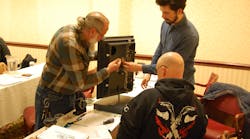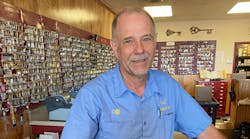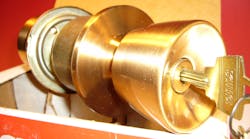This October, institutional locksmiths from all over will congregate in Chicago for the 2007 Institutional Locksmiths Association National Educational Conference and Trade Show (www.ilanational.org). Show dates are Oct. 9-13 at the Holiday Inn Willowbrook.
I spoke with a couple of locksmiths about this event, one from the east coast and one from the west. Let's go left to right and begin with my dialogue with Dean Nickel of Seattle , Wash.
Nickel works at the Harborview Medical Center , a King County-owned facility for the critically injured and indigent population. The University of Washington runs the facility and has employed Nickel since November 1996. Here are Locksmith Ledger's questions and Nickel's answers.
What were you doing before you began working at your present job?
I was working for Argen's Lock and Safe in Seattle when I heard about the job. I found out it paid a bit more but that the benefits were much, much better than what I had at the time. I applied and was their second choice. It turned out that their first choice had leveraged this to get a raise at his current job so I was offered the job.
Are you happier doing this kind of locksmithing?
It has its good and bad days just like an outside locksmith. The good is that I don't have to worry about parts, tools or whether or not the client will pay. The bad in my case is that I have to deal with TB isolation rooms and labs.
How many years have you been working as an in-house locksmith?
I've been an in-house for more than 10 years and a locksmith in general for 17.
What are you looking forward to learning at this upcoming convention?
I'm not sure if I can make the convention this year as it is the same week as the PLA (Pacific Locksmith Association) conference where I've offered my services as an instructor.
Even though you're qualified to instruct, do you still take classes? What type of things do you still enjoy learning about?
Oh yes, I still take classes and I learn every time I teach. I actually learn more than when I take a class. I take classes because I find myself learning something new even if it's a class I've taken before. So let's say I take a master-keying class for the ninth time (yes, I've taken 8 so far). The instructor will bring something to the class that others haven't. Each of us teaches differently and this gives the students exposure to different ideas each time. I don't care too much about which class I take because I'm more interested in the journey itself. Although I haven't done automotive locksmithing for 10 years, I still want to learn; I may need it or have an opportunity to help someone else.
In the ILA newsletter, you wrote about your experience and mentioned that you were looking forward to buying people drinks until you realized that the food and drinks were already taken care of. How do you meet these people?
I meet most of them in online forums for locksmiths.
Do you find that you all have much in common? How about any glaring differences from different parts of the country?
There doesn't seem to be much of a difference between locksmiths around the world. We all have much of the same problems. I believe other locksmiths are our best hope for solving our own problems. In online forums I have the opportunity to meet people and help others while helping myself. Something simple like the bittings to a particular code, how to find parts for a lock made in another country, etc. I believe the computer is shrinking the differences between us reminds all of us that we are not alone.
Q&A: VERNON KELLEY
I first met Vernon Kelley back in 1991 while he was working for a locksmith friend of mine. He was a rookie then and it's a real pleasure to see how far he's come and what he's accomplished in his career as a locksmith. Vernon was good enough to give me a little time for a sit down interview at his office at The College of New Jersey. Here are Ledger's questions and Kelley's answers.
Have you attended ILA conventions in the past?
Every one since the year 2000.
What's impressed you the most? Do they get better every year?
The camaraderie improves every year. More and more people seem to attend and say nicer things about it as we've gone along. For many of us, it's the only time we get to see each other.
From how far do people come?
Usually from all across the country. The strength of our membership comes from the Philadelphia and Chicago areas and I'd say almost 70 percent come from those two places. I know we've had people from Texas , Las Vegas , the South and we've had a couple from Canada .
Who attends an ILA convention?
Mostly institutional locksmiths, although we do have associate members who attend as representatives of various distributors and manufacturers. We also encourage regular commercial locksmiths to attend. Our class schedule and meetings are geared toward the institutional locksmiths. They should understand that we aren't going to be discussing Grade 3 residential hardware and automotive stuff. We'll be dealing with access control and Grade 1, high end, extra heavy duty closers, locksets, exit devices and the like.
That's a good point. You guys aren't typically dealing with the public the way a locksmith who owns or works for a business does. I've heard in-house locksmiths say that in spite of this, they do have customers. Who are your customers?
Institutional locksmiths don't do it for a profit. Our customer base is the institution itself.
So there's no profit motive involved which helps you focus on the task at hand and not how much to charge for it.
That is correct. The down side is that you have to deal with politics of a big institution; as much as you'd like to say it doesn't exist, it does. You deal with people more interested in a personal agenda instead of what's best for the institution. The trick is to be able to focus on what you're trying to accomplish and not takes things personally.
Regarding the upcoming convention; what's it been like in the past and have there been changes made to improve it?
We've tried to do conventions a number of different ways. Many times we've approached a particular manufacturer to sponsor it such as Ingersoll-Rand or ASSA ABLOY. Other times, to bring some different flavor, we've either sponsored the event ourselves or worked with a supplier. In that case we were responsible for coordinating education and advertising for it. Of course when you have it sponsored by a manufacturer, the classes will be about their products. A couple of years ago, a distributor hosted it for us and we got to have manufacturers big and small participate. It's great for the smaller ones who might be able to sponsor an entire event like this.
My understanding of what the usual purpose of ILA gatherings is education and food, true?
Yes the main focus is education. Many of our members are using their own money and can't write it off as a business expense we do the classes for a low cost.
Are most of the men and women who attend doing so with the support of their employer?
About half. Half seem to get funding and time off. The other half take care of it themselves or they might get the time but don't receive help with travel, hotel or tuition for classes.
Let's talk to some of the folks reading this who fall into this latter category. I understand that the upcoming show in Chicago is not being sponsored by anyone.
We, the ILA, are running it top to bottom, soup to nuts. We're having our own trade show and arranging all of the classes. The president of the ILA, Kurt Kloeckner, is out in that area and is doing a really good job. Whether or not your employer is footing the bill, knowledge is transportable to anywhere.
And more knowledge in many cases helps you to become more valuable to your employer or a future one. Is it this kind of knowledge attendees can expect to leave with?
The knowledge you come away with will increase your value but also, this knowledge makes your job easier. This would be an investment in you. I've had both kinds of employers - ones who will pay for every ounce of training and employers who would have trouble just giving me the time to do it. I've always paid for classes when I had to because I always saw it as that important.
How long have you been here at the college?
I've worked for the State of New Jersey since 1995 and I transferred here in 1999.
Let's talk a little bit about your responsibilities here at the college, and what you've done with the ILA.
Here at The College of New Jersey I'm the Supervisor of Access Control; if it locks mechanically or electronically, then we're responsible for it. That includes mechanical locksets, master key systems, standalone electronic locks which we have more than 800 of on campus right now as well as a fully networked access control system that controls over 200 locations on campus. Most of those locations are tied into automatic operators that we're also responsible for.
I find that many institutional locksmiths have a substantial amount of control and responsibility, and then there are some who deal with little beyond mechanical locks, some masterkeying and door closers and panic devices. What's the big difference and how can some of these others move in the direction of having as much control and responsibility as the Vernons of the world?
It all comes back to education. You have to present yourself as a knowledgeable professional. I've known some very knowledgeable locksmiths in the 18 years I've been doing this that have presented themselves as less than professional. Some of them just don't want to do the work required to make a better name for themselves within their institution in order to have more responsibility. With that responsibility, I have freedom to do what I need to do in my job without my boss looking over my shoulder the entire time.
And this is because you're trusted to do the right thing?
Because I'm trusted and we've proven here in our shop that we are adults who come to work, handle all of our own work orders, order our own product, write our own specifications and standards. My boss doesn't visit me in my shop more than three or four times a year because he knows we're doing the right thing and that he doesn't need to baby-sit us.
How much of this situation do you attribute to your ILA involvement?
That goes a long way towards it. You meet people who are very good at what they do. When you begin educating yourself, you quickly learn that more education is what you need. For people who are attending their first ILA convention, they'll be around others who have been doing this for two or three decades in some cases and that's a lot of information to tap into. They've learned that if you look and act like a professional, you will be rewarded for it. Sometimes the reward is monetary; sometimes it's being subsidized to go to seminars and conventions and sometimes the reward is simply having the ability to run your operation without being micromanaged.
What's your current role within the ILA?
I'm currently the president of the Delaware Valley Chapter.
At this year's convention, what are you looking forward to?
I think we're going to have a wider range of classes that will appeal to more people. We'll also have a wider breadth of representation from manufacturers and a rather sizeable trade show. We'll have 50 or 60 tables with a wide variety of manufacturers and suppliers.
It's no secret in the industry that food can be a priority among the ranks. Will there be enough to go around?
Most nights will consist of meals provided by various sponsors. At our Awards Banquet, we'll get to mingle in a slightly more formal setting.
How could people find out more? Is there a web site?
Yes, anyone can go to WWW.ILANATIONAL.ORG.





